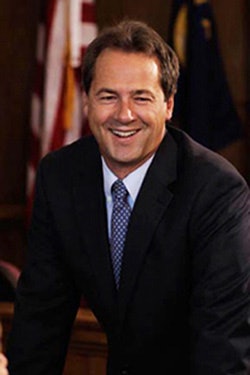HELENA, Mont. — Gov. Steve Bullock signed an executive order June 16 to establish a state Office of American Indian Health, saying the current health care system in Indian Country limits access to preventative care and quality health care services and providers.
Bullock issued the directive with health officials and tribal leaders at the conclusion of the Montana Tribal Leaders’ Summit at the Capitol.
“We have been falling short,” Bullock said.
 Gov. Steve Bullock
Gov. Steve BullockHe said the new office will address vast health disparities between American Indians and non-Indians in the state. A study done by the Department of Health and Human Services in 2013 shows that the average life expectancy for American Indians in Montana is 20 years shorter than that of non-Indians.
The new office will consist of one new full-time employee in the Department of Public Health and Human Services who will focus reducing those disparities through identifying the reasons behind them and creating an action plan, Bullock said. That person will collaborate with other state agencies, tribal leaders and urban Indian health centers.
Officials said they don’t know yet how much the efforts will cost the state.
Kevin Howlett, director of the Confederated Salish and Kootenai Tribal Health Department, said Indian people have been forgotten in terms of federal resources provided by Indian Health Service.
“It’s sad the absence of health care that Indian people have to put up with,” Howlett said. “I think the thing that’s important about this … I hope that it’s something that really means something. The problems didn’t start today and they won’t be solved tomorrow. It’s about the future.”
The U.S. government provides health care to American Indians and Alaska Natives as part of its trust responsibility to tribes that gave up their land when the United States was being formed. But last year Montana tribal leaders pressed officials to overhaul the federal health care system for Native Americans, citing a shortage of trained medical personnel and misdiagnosed illnesses among the problems they’ve experienced.
In response to those concerns, then Indian Health Service acting director Yvette Roubideaux said their funding was inadequate to meet the needs and that greater efforts were needed at the local level. Currently, Indian Health Service is without a national director and in Montana, there’s no permanent Indian Health regional director.
According to Montana U.S. Sen Jon Tester, who is vice chairman of the Senate Indian Affairs Committee, Indian Health Service has been chronically underfunded. He said that Bullock’s directive will improve the health of Native American families in Montana.
“I look forward to continue working with him (Bullock) to make all Montanans healthier and ensure that the federal government upholds its trust responsibility to Indian Country, he said.
In addition to the executive order, Montana’s new law to expand Medicaid will extend Medicaid eligibility to about 20,000 Native Americans if approved by the federal government.














